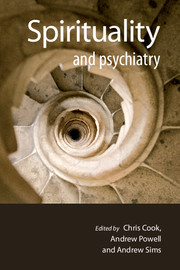Book contents
- Frontmatter
- Contents
- List of contributors
- List of tables, boxes and figures
- Foreword
- Preface
- The Spirituality and Psychiatry Special Interest Group of the Royal College of Psychiatrists
- 1 Spirituality in psychiatry
- 2 Assessing spiritual needs
- 3 Psychosis
- 4 Suicide
- 5 Child and adolescent psychiatry
- 6 Psychotherapy
- 7 Intellectual disability
- 8 Substance misuse
- 9 Neuroscience of the spirit
- 10 Spiritual care in the NHS
- 11 The transpersonal perspective
- 12 Religion and religious experiences
- 13 Pathological spirituality
- 14 Ageing
- Index
9 - Neuroscience of the spirit
Published online by Cambridge University Press: 02 January 2018
- Frontmatter
- Contents
- List of contributors
- List of tables, boxes and figures
- Foreword
- Preface
- The Spirituality and Psychiatry Special Interest Group of the Royal College of Psychiatrists
- 1 Spirituality in psychiatry
- 2 Assessing spiritual needs
- 3 Psychosis
- 4 Suicide
- 5 Child and adolescent psychiatry
- 6 Psychotherapy
- 7 Intellectual disability
- 8 Substance misuse
- 9 Neuroscience of the spirit
- 10 Spiritual care in the NHS
- 11 The transpersonal perspective
- 12 Religion and religious experiences
- 13 Pathological spirituality
- 14 Ageing
- Index
Summary
Since the 1980s there has been a growing recognition that organ-based medicine is very limiting when considering the genesis of disease in humans. Mind–body medicine is still a growing area, but it has been shown that psychological experience, emotional states and pathological styles of behaviour can all lead directly to physical illness. This recognition has led to the field of psychoneuroimmunology, which has now developed to the point where mental states can be seen to be linked to heart disease and cancers through specific physiological pathways.
It is in this setting that there has been a re-evaluation, particularly by the medical profession, of spiritual medicine that brought widespread recognition that a spiritual component must be considered in both physical and mental illness. In this chapter I will first consider some of the reductionist mechanisms underlying spiritual medicine. Spiritual medicine may be perceived as the spiritual dimension of healing, in which the highestorder holistic processes of the individual are expressed and their expression leads to healing; for example, the aims and goals of the individual, their interaction within their social systems and their transpersonal beliefs.
I will look at the consequences for reductionist science, if the effects of prayer and distant healing are accepted into the main body of scientific knowledge. I will also touch on miracles, that is spiritual healing where the locus of the healing is not yet understood by reductionist science and so can be attributed to forces outside the materialistic realm and consequently outside our reductionist paradigm.
Science has always been reluctant to approach spiritual matters seriously, but this attitude is changing. There are numerous reasons for this, but the most important for conventional medicine is simply that spiritual medicine has been shown to work (Koenig et al, 2001). There is, in addition, an evergrowing demand from students for medical courses that include a spiritual dimension. The percentage of US medical schools teaching courses in spiritual medicine has increased dramatically during the past decade; from 3% in 1995, to 40% in 1998 (Levin et al, 1997), to 100% in 2001. In 2001, the Templeton Foundation supported the publication of the Handbook of Religion and Health (Koenig et al, 2001), which draws together the numerous scientific studies that underpin this field.
- Type
- Chapter
- Information
- Spirituality and Psychiatry , pp. 169 - 189Publisher: Royal College of PsychiatristsPrint publication year: 2009

